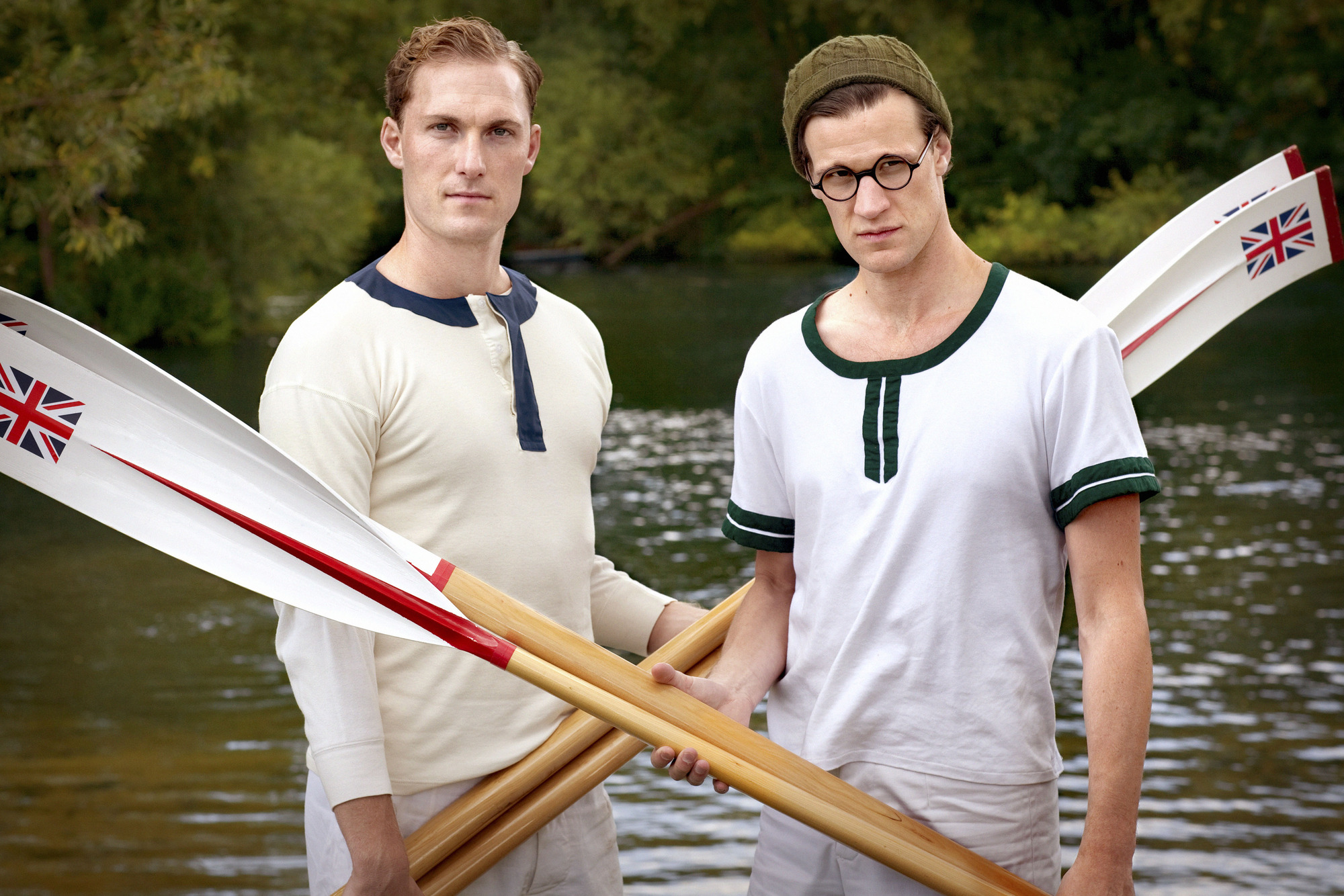Bert & Dickie
Wednesday, 25 July 2012 - Reviewed by Matt Hills
 Bert & Dickie
Bert & DickieWritten by William Ivory
Directed by David Blair
Broadcast on BBC One - 25 July 2012
Perfectly timed to surf, or even scull, a wave of Olympic hype comes this feelgood drama celebrating real-life British achievements in the “austerity games” of 1948, all rationing and budgetary belt-tightening. From Chris Cleave’s compelling novel Gold to Walford’s leg of the torch relay, the Olympics has already found a contemporary home in popular fiction and soapland. It’s only fair that period drama should get a look-in.
Bert & Dickie is a curious mix of politicians sitting in stately rooms and sportsmen slugging it out on the river. The script can’t resist taking a few wry pot shots at commercialisation and sponsorship ("I can see it catching on") as well as gently mocking Olympic 'events' like poetry and etching. Some of my favourite sequences feature a TV salesroom transformed into the site of impromptu, amateur commentary delivered to a crowd of television-less punters; a far cry from the global media event confronting us today.
Director David Blair has previously worked with Christopher Eccleston on Accused, and David Tennant on Takin’ Over the Asylum. Here he bags another Doctor as his leading man, with Matt Smith putting in a spirited, subtle performance as sculler Bert Bushnell (displaying just as much interest in his headwear as he often does in Doctor Who). Bert and Dickie are thrown together as part of “Team GB ’48”, their partnership aimed at maximizing medal-winning possibilities. Whereas Bert doesn’t hail from a world of upper class privilege, Dickie seems born to Henley life, with his father – played capably by Geoffrey Palmer – being a well-established figure in the milieu of rowing clubs, blazers, and sporting the right tie. Writer William Ivory focuses on clunky class conflict, with dialogue that sometimes doesn't make it to the winner’s podium. You just know that “chip”, “shoulder”, and “silver spoon” are guaranteed to turn up before too long.
Sam Hoare puts in a strong showing as Dickie Burnell, and there’s a pleasing symmetry in the way that both Bert and Dickie confide in each other’s Dad. Dramas about the Olympics seem fated to follow a certain structure: shadowing athletes through the build-up, the heats, and on into the final-as-finale. Olympic competition provides a dramatic shape that’s too strong to resist, perhaps, but Bert & Dickie makes no real effort to innovate on this front. It has a lot of fun pointing up parallels and differences in relation to London 2012, though. Bert and Dickie appear to be pretty much in charge of their own strategy, seemingly inventing what they’re doing as they go along, whereas the infinitely more professionalized approach of today suggests that a fuller support team would be on hand. And their kit is home-made, as (historical factoid alert!) government funding doesn’t stretch to supplying shorts to male athletes, just official Olympic Y-fronts. Imagine a London 2012 where underpants were the only official garment… no corporate-badged sportswear and logo-smeared t-shirts. The curious thing about this drama is that it makes 1948 seem more appealing, and somehow more honourable, than various branding debacles dominating recent headlines.
Tugging at the heartstrings, Bert & Dickie joyfully implies that even at times of great hardship and struggle, the country can join together via rituals of sporting prowess, class differences magically forgotten. It’s a rather hazy, nostalgia-fuelled approach to dramatizing the Olympics, but then this is a primetime BBC1 vision through-and-through, not a BBC2 satire of jubilympic incompetence, or a BBC4-style subversion of Olympic ideals. Instead, Bert & Dickie is a sharply tailored crowd-pleaser. Despite ringing out a rather jingoistic tone, there are some touching moments when Bert befriends an American rower who would’ve been his rival. Despite that, other nationalities don’t get much screen time or dramatic development – even the feared sculling Danes aren’t brought alive as characters – and things remain resolutely anglo-american.
Alexandra Moen appears in a supporting role as Dickie’s wife, but on the whole this is a story of fathers and sons, (male) politicians and athletes. Female roles are underdeveloped and dramatically marginal, restricted to supportive girlfriends who make tripe and onion sandwiches – “the stuff of champions!” – and mothers whose nerves can’t take the stress of competition. Despite the real-life austerity games featuring Dutch “flying housewife” Fanny Blankers-Koen, you’re given little sense of female Olympic achievements here. Bert & Dickie is an apt title, emphasising how much this is purely a story of men and boys.
Blair’s taut direction gives things a constant emotional pull. The decision to focus on Smith and Hoare in tight close-up as they scull for glory is a particularly inspired moment; exertion’s etched on their faces as they move out of focus and into the blur of Olympic legend. Elsewhere Blair makes effective use of underwater camera (strangely reminiscent of The Curse of Fenric, but perhaps that’s just me), and puts production value firmly on screen via picture-postcard locations. This is typically celebratory stuff with just a slight undercurrent of 2012 critique, nonetheless stressing cross-class togetherness in tough times. “We’re all in it together” could almost be the tagline, with Bushnell and Burnell as poster boys for national unity... both then and now. I imagine Bert & Dickie will have been enjoyed by Dave and Georgie, despite the way it slyly sides with old-fashioned amateurism over today’s corporate spectacle.




